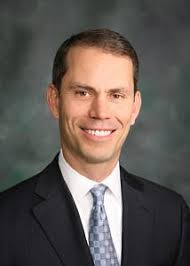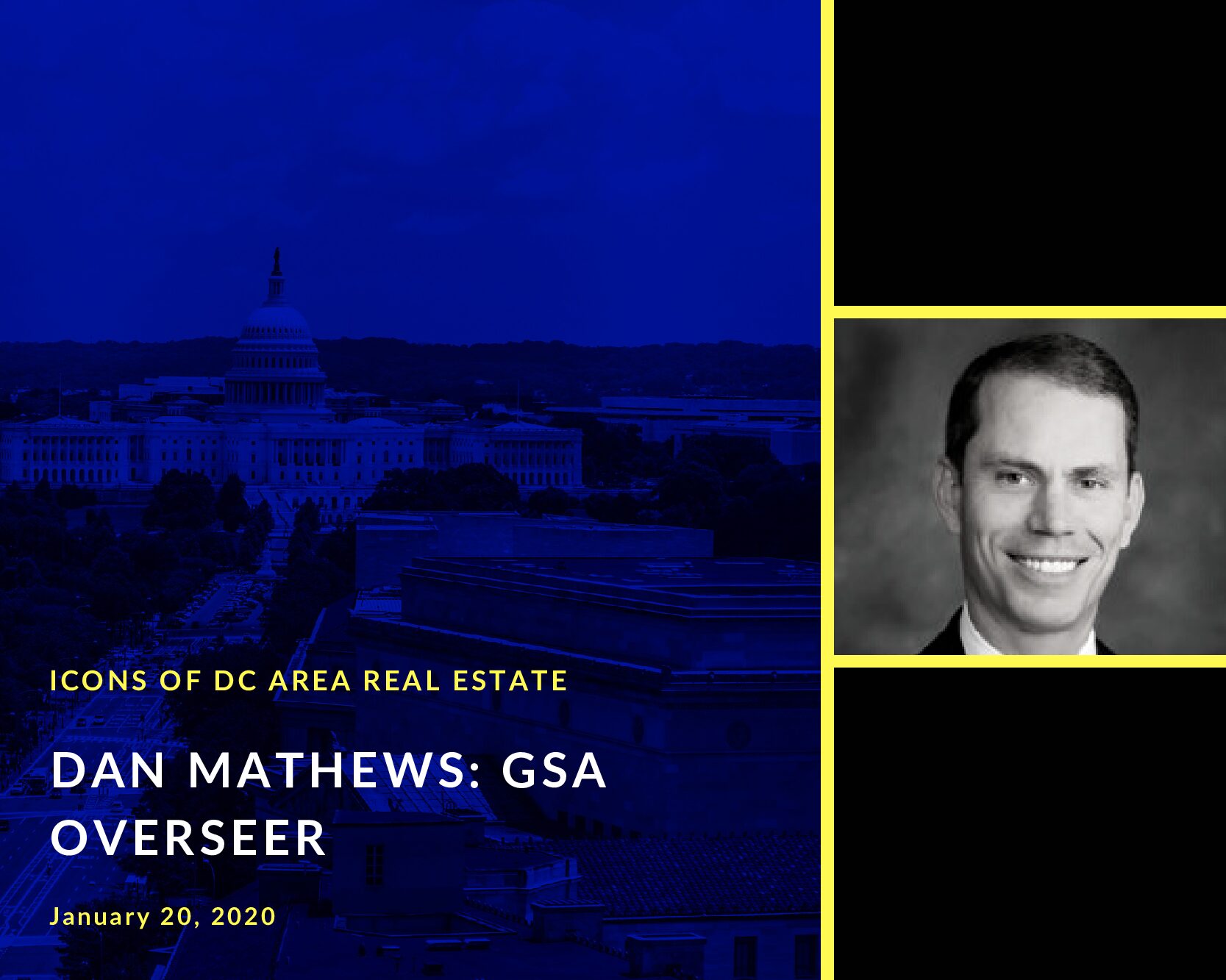

Bio
As the Government Services Administration’s Public Building Services Commissioner, he manages the nationwide asset management, design, construction, leasing, building management and disposal of approximately 371 million square feet of government-owned and leased space across the United States and six territories.
Prior to joining GSA, Mathews served as the Republican Staff Director of the House Transportation and Infrastructure Committee’s Subcommittee on Economic Development, Public Buildings, and Emergency Management. This committee has jurisdiction over federal buildings and courthouses, the General Services Administration, the Smithsonian, the Kennedy Center, the National Gallery of Art, and numerous other federal facilities.
Prior to serving on the Transportation and Infrastructure Committee, Mathews worked for the House Rules Committee and several California Members of Congress.
Mathews holds a bachelor’s in government and philosophy from Georgetown University.
Show Notes
GSA Stats
- GSA formed in 1949 (4:00)
- Real Property & Personal Property (4:15)
- 370MM s.f.
- 5,500 employees
- 30,000 contractors
- $12.5B per year of expenditures
- U.S. and U.S. territories
- United Nations (5:45)
Origins
- Born in Naples, Italy and the son of a U.S. Navy pilot who traveled around the world (6:30)
- Grew up as a Navy “brat”
- Influences of traveling- flexibility and amazing exposure to other locations (10:00)
- Inspired by the outdoors
- Mother was a nurse and infused the idea of “duty” on him (11:00)
- Colorblindness eliminated his ability to fly (11:30)
Education
- Falls Church H.S.
- Earliest memories of outdoors- camping in Mt. Baker in the State of Washington (13:00)
- Passion is rock climbing
- Went initially to the University of Colorado Boulder (14:00)
- Studied engineering (14:30)
- Internship on Capitol Hill (15:00)
- Decided to transfer to Georgetown (16:00)
- Georgetown for his Junior & Senior years for Government studies (16:10)
- Thought about ROTC and his father convinced him not to do it (16:50)
- Philosophy & Government studies influenced him (18:15)
- Loved Aristotle’s concept of “Ideas into Action” through government (18:35)
- Discusses origins of U.S. government- perspective of how the country’s government was formed by the Founding Fathers (19:40)
- Education in Philosophy is the most important part of his learnings to understand complex structures in government- one of his greatest strengths (22:00)
Career
- First job in Congress was secured by canvassing every Republican house member and he secured his first job with a Congressman (23:30)
- Congress is an “entrepreneurial” environment (26:25)
- Capitol Hill is like a fire station- a rush to get things done and then quiet for a long time in between (28:15)
- After his boss at Congress lost his re-election, he went to work for his brother in a furniture business in North Carolina and learned about real estate leasing there (29:00)
- Came back to Washington to Congress again subsequently who then led the Public Building subcommittee where he learned about government real estate (31:15)
- Congressional committee is like the “Board of Directors” for GSA on its function (33:40)
- 22 yrs. on this subcommittee to understand the workings of GSA
- When interviewed he was asked what he’d do on the job: (35:30)
- Save $5B through leasing
- Restructure ownership portfolio
- Public private partnerships
- Was brought on to PBS head role to accomplish the goals he stated (36:20)
- Overachieved goals he set (37:00)
- Complex situation due to multiple parties’ objectives (37:45)
- Perspective from so much time in Congress helped him understand his role (38:30)
- Fortunate to have a good team that understood what needed to be done to reach his goals (40:15)
- Biggest surprise was that GSA was replacing 42% of leases with long term solutions, 58% were “short term” issues (41:45)
- Paying a premium for short term leases (42:30)
- Avg. actual lease term is over 26.9 yrs. (43:30)
- New lease average is 5 yrs. and needs to be lengthened (44:00)
- Congress provided a model that requires GSA to stand on its own regarding revenue generation (45:00)
- GSA has authority to commit the government to obligations of up to 20 yrs. with only one year of lease amount allocated (46:00)
- Federal Building Fund was allocated for future lease obligations (47:40)
- Why lease space? (49:00)
- Federal space requirements change, so needs flexibility for leasing (49:45)
- Procurement makes owning buildings more expensive (51:00)
- Costs to build are such that leasing may be more cost effective (51:15)
- Yet, with special purpose uses owned buildings make more sense (52:10)
- Future
- Office use currently is between 10-30% overall, with exceptions (54:00)
- Remote office use is more efficient for many which will have an impact (54:50)
- Trump International Hotel (Old Post Office) (58:15)
- Public Private Partnership was a win/win deal for the government and private sector (59:30)
- Took a $6MM loss to a $3MM gain for GSA (59:50)
- Older buildings in SW & SE Washington (1:00:10)
- Questions about these buildings coming (1:01:00)
- Public Private Partnership has limitations- relating to FBI SFO structure (1:01:30)
- Not enough value in the FBI site to equate for the exchange for the new site (1:04:40)
- Another exchange case- Volpe Center in Cambridge, MA where the real estate was worth enough for the exchange (1:06:00)
- Leasing mechanics (1:08:00)
- Agency with a requirement (expiring lease or new requirement) (1:08:40)
- Translate mission requirement into a real estate requirement (1:09:00)
- Federally owned space checked first (1:09:20)
- Then, a lease alternative is chosen (1:09: 40)
- If over $3.2MM lease obligation per yr., then Congress must approve it (1:10:00)
- OMB plays a big role in lease prospectus prior to presentation to Congress for approval (1:10:20)
- GSA puts out prospectus in advance of Congressional approval (1:11:00)
- The right way to handle procurement is to do it in advance with OMB, Congress and GSA working together in advance of final approval (1:12:00)
- Congressional approval is the final step for the lease execution (1:13:20)
- GSA must execute based on terms of the lease and keep the agency in line (1:13:50)
- Occupancy agreement between GSA and agencies (1:15:00)
- GSA has to backfill space that vacates, so GSA acts as a master lessee (1:17:00)
- SEC lease case where they obligated for space where they didn’t have authority to occupy the space (1:17:30)
- Rate to agency- 5% or 7% fee for rental obligations applied to agency costs for occupancy to GSA (1:19:00)
- Incentivized to keep vacancy low (1:20:00)
- Simplified leases compared to standard lease form (1:22:30)
- Smaller leases are typically “simplified leases” (1:23:00)
- Several large leases have statutory language is embedded in form leases (1:23:30)
- As an incoming Commissioner of GSA you need to pick 3 priorities to address (1:24:30)
- Lease cost approach (1:25:30)
- Went from 42% of long term obligations to over 70% long term obligations (1:25:40)
- Lease cost relative to market measured to make sure that the lease is at market or lower (1:26:20)
- More long term leases helps value creation for portfolio (1:27:00)
- Financing advantages for long term leases are significant with the credit offering considerable leverage for lower cost capital applied to lease rates (1:28:20)
- Exceeded goals and earned a B+/A- overall, but for leasing an A. On owned portfolio he has been frustrated to accomplish goals from Federal Building Fund to address building deterioration (1:30:45)
Future & Lessons Learned
- Next position he would like to bring his experience to oversee a large portfolio or perhaps advocate based on his knowledge to keep the momentum going from what he accomplished (1:33:45)
- Changes from pandemic will have impact going forward (1:35:30)
- Leadership lessons (1:37:00)
- Have good ideas and articulate them
- Good value proposition
- Concentrate energy on objectives
- Create conditions for organization to be successful
- Measure the right things- the most valuable leases were most important
- Aligning and visibility
- Challenge with Government is dealing with other people’s money (1:41:00)
- Tenants often don’t understand that it’s not “their money” and they need to understand that wants are not needs (1:41:40)
- Life priorities (1:44:30)
- “School, God, Friends”- From Georgetown (1:44:45)
- Work
- Family
- Charity- Leukemia/Lymphoma work
- Advice to 25 yr. old self- “Put more time into relationships” (1:46:30)
- Billboard- Understand and pursue the “good” (1:48:00)
Postscript
- Tom Amos asks about GSA lease at Constitution Center SEC lease (1:50:00)
- Story about property being sold subject to the broken lease
- GAO published that the leases exceeded the market by 10% between 2010 to 2014 whereas GSA was able to reduce lease exposure to 14% below market (1:52:30)

